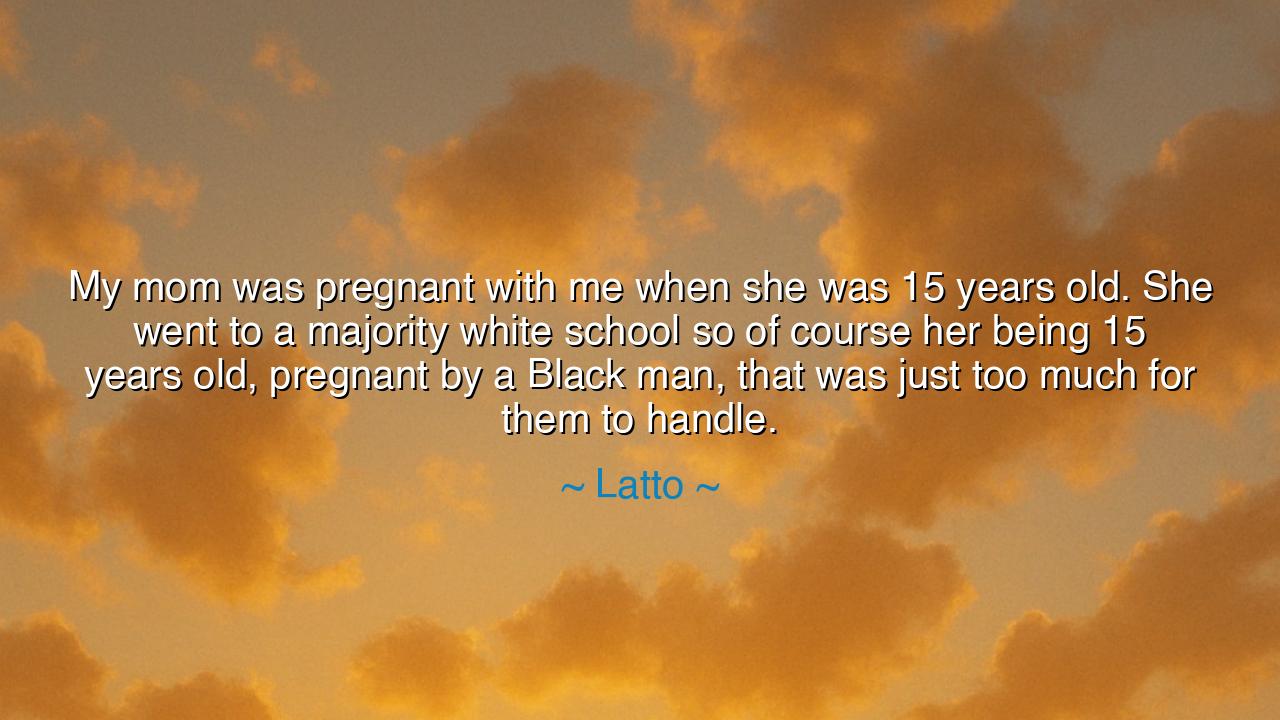
My mom was pregnant with me when she was 15 years old. She went
My mom was pregnant with me when she was 15 years old. She went to a majority white school so of course her being 15 years old, pregnant by a Black man, that was just too much for them to handle.






The words of Latto, “My mom was pregnant with me when she was 15 years old. She went to a majority white school so of course her being 15 years old, pregnant by a Black man, that was just too much for them to handle,” rise like a modern psalm of struggle and survival. Beneath their contemporary rhythm lies a timeless theme — the strength of the mother, the burden of prejudice, and the unyielding power of love that endures against judgment. This is not merely a story of a young girl in a divided society; it is a tale as old as humanity itself — the story of those who are forced to bear both life and scorn, yet emerge unbroken.
To understand these words, one must see beyond the surface. They are not spoken with bitterness, but with reverence — a daughter honoring the courage of a woman who chose life despite condemnation. Latto’s mother carried not only a child, but also the weight of society’s cruelty, the sting of racial tension, and the loneliness of youth. Her story reflects a deep truth: that courage is not the absence of fear, but the choice to continue when the world stands against you. The ancients would have called such a woman a warrior of the hearth, one who defies shame and fate to bring forth light from darkness.
The phrase “too much for them to handle” speaks to the silent violence of judgment — the way society punishes those who do not fit its mold. In every era, the strong-hearted have been cast out for daring to live authentically. The ancient poets wrote of those who defied unjust laws, who bore the scorn of others for the sake of truth or love. Here, Latto’s mother becomes such a figure — a symbol of defiance and dignity, standing firm amid whispers and stares. She carried not only her child but her pride, unbowed by the narrowness of those who could not see her humanity.
History offers many mirrors to this story. Consider the tale of Sojourner Truth, born into slavery, who faced rejection not only from her oppressors but from those who feared her strength. She was mocked for her speech, her color, her courage — yet she spoke anyway. “Ain’t I a woman?” she cried, and in those words, she shattered the silence of generations. Like Latto’s mother, she faced a world that deemed her existence inconvenient, but she transformed pain into legacy. Such women, though separated by centuries, share the same fire — the refusal to let shame define them.
There is also in this story a reminder of how injustice breeds resilience. What begins as cruelty becomes the forge of greatness. Latto herself stands as living proof of her mother’s endurance. From a child born of struggle came an artist who now speaks her truth to millions, unafraid, unashamed. In this way, pain becomes inheritance — not of sorrow, but of strength. The ancients would have said: “From iron pressure, the sword is born; from hardship, the spirit that cannot be broken.”
But this quote is more than history; it is a mirror held up to the present. It reminds us that prejudice still wounds, that judgment still divides, and that love still must defend itself against ignorance. The lesson is not only to honor the courage of those who endured, but to ensure that such endurance is no longer required. Each generation must become gentler, more just, more aware of how the small cruelties of society can shape a life. Compassion must become the new inheritance — the gift we pass on to those yet unborn.
So, children of tomorrow, remember this teaching: Do not judge what you do not understand. When you see someone walking a hard path, do not turn away; offer your hand. When the world whispers shame, speak kindness. And when you hear the story of someone who survived what others could not bear, listen — for their courage is your inheritance.
For in the end, Latto’s words are not only a reflection of the past, but a prophecy for the future. They remind us that greatness is often born from scorn, and that love — fierce, unyielding, and proud — is the mightiest rebellion against prejudice. Her mother’s story is not one of tragedy, but of triumph: a young girl who faced the world’s judgment and gave it life in return. And in that act, she joined the ranks of the ancient heroes — not of war, but of the human heart.






AAdministratorAdministrator
Welcome, honored guests. Please leave a comment, we will respond soon